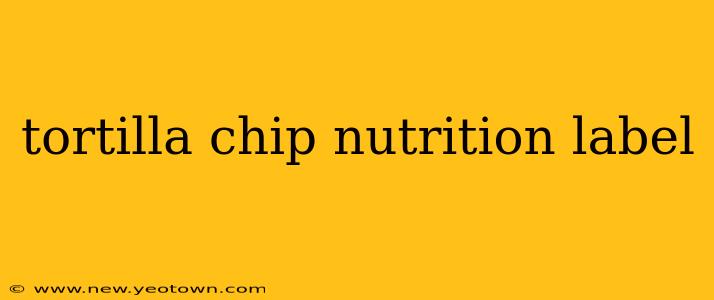Let's be honest, tortilla chips are a tempting snack. That satisfying crunch, the versatility – they're practically party staples. But before you dive headfirst into a bag, it's worth understanding what's actually in those crunchy delights. This isn't about guilt-tripping; it's about making informed choices so you can enjoy your chips without sacrificing your health goals. We'll navigate the often-confusing world of tortilla chip nutrition labels together, uncovering hidden facts and answering common questions.
What are the main ingredients in tortilla chips?
Typically, the primary ingredients in tortilla chips are simple: corn masa (ground corn), oil (often vegetable oil, but sometimes other oils like sunflower or canola), and salt. However, this can vary significantly depending on the brand and type of chip. Some brands might include additional ingredients like preservatives, spices, or flavor enhancers. Reading the ingredient list carefully is key – the ingredients are listed in order of weight, meaning the ingredient listed first is the most prevalent.
How many calories are in a serving of tortilla chips?
This is a highly variable question! A "serving size" is usually around 1 ounce (about 14 chips), but this can fluctuate depending on the brand and the chip's thickness and size. One serving might contain anywhere from 130 to 170 calories or more. The calorie count is largely influenced by the type of oil used and the presence of any added ingredients. Always check the specific nutrition information on the bag you’re purchasing.
What is the fat content of tortilla chips?
Fat content is another area with significant variation. A serving can range from 8 to 12 grams of fat, with most of this being unsaturated fat. However, the type of fat matters. Trans fats should be avoided, while unsaturated fats (like those found in vegetable oils) are generally considered healthier fats. Again, the specific type of oil used in the manufacturing process influences the fat content and quality.
Are tortilla chips a good source of fiber?
While tortilla chips can offer some fiber, it's not usually a significant source. A serving might provide around 1-2 grams of fiber, which is a relatively small contribution to your daily fiber needs. For a better fiber boost, consider whole-wheat tortilla chips or adding them to a meal or snack that is rich in fiber, like a bowl of chili.
What about sodium in tortilla chips?
Sodium content is often a major concern. Many tortilla chips are relatively high in sodium, often exceeding 150-200mg per serving. Regular consumption of high-sodium snacks can contribute to high blood pressure and other health issues. Opting for low-sodium or reduced-sodium versions can make a big difference.
How can I choose healthier tortilla chips?
Choosing healthier tortilla chips involves careful label reading. Look for options with:
- Lower calorie count: Aim for brands with fewer calories per serving.
- Lower fat content: Choose chips made with healthier unsaturated fats.
- Lower sodium content: Select low-sodium or reduced-sodium varieties.
- Shorter ingredient lists: Fewer ingredients generally mean fewer additives.
- Whole grain options: Whole wheat tortilla chips offer more fiber.
Making informed choices is about finding a balance. You can enjoy a satisfying snack without necessarily sacrificing your health goals by paying attention to the nutrition label and making conscious selections. Remember, moderation is key! A small handful as part of a balanced diet is likely perfectly fine.

